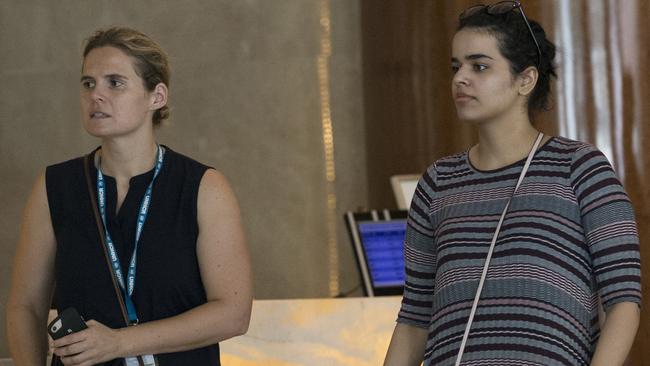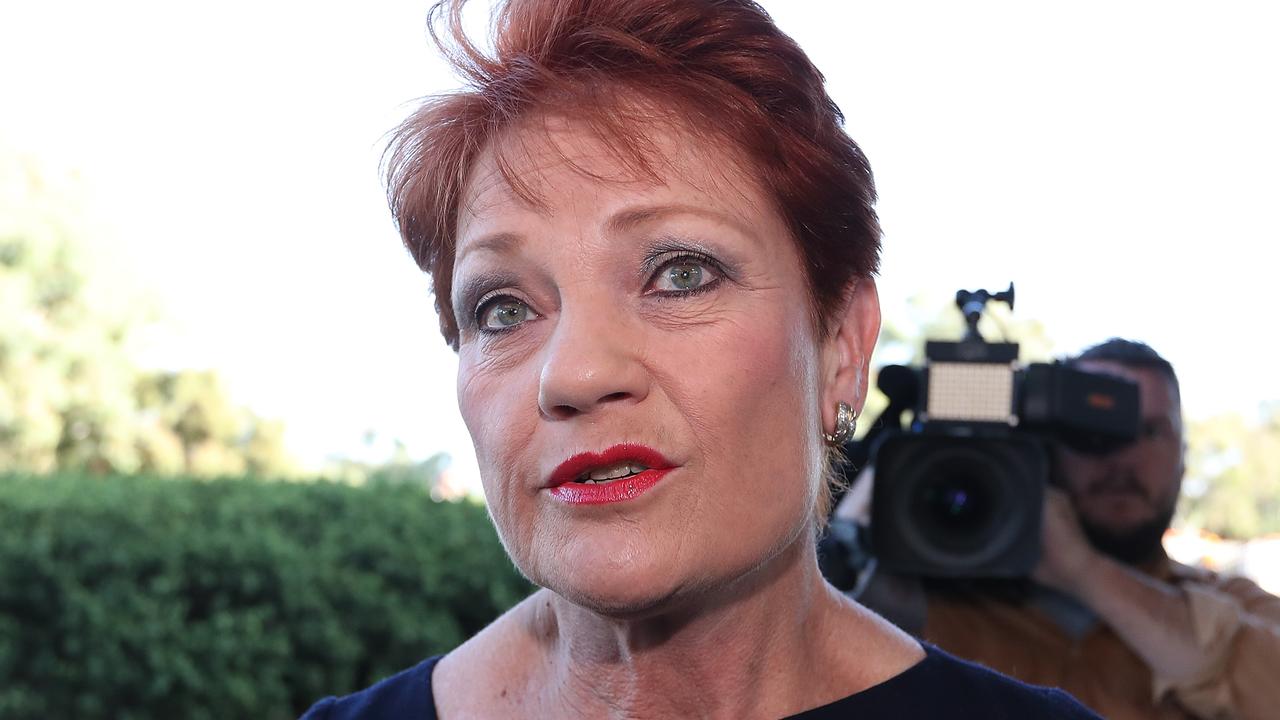Secret women’s network led the charge to help Rahaf Mohammed al-Qunun
An underground network of Australian women who helped a Saudi teen escape are shattered she will not be joining them.

An underground network of Australian women who helped a Saudi teenager escape from life under the abaya have been shattered by news that she will not be joining them in Sydney.
The group, which operates in secret, and is largely funded by anonymous donors, had gathered yesterday in a “safe house” — an apartment in a skyrise building in Sydney — to await the arrival of Rahaf Mohammed al-Qunun, whose bold bid for freedom made headlines around the world.
For days they had been congratulating themselves on Rahaf’s audacious and ultimately successful campaign to live the rest of her life in freedom, only to hear, in the dying hours, that she would not be coming to Australia.
Immigration sources confirmed to The Weekend Australian that Rahaf’s application for asylum, made in such drastic circumstances from Bangkok airport, will be taken up not by Australia, but by Canada.
“Everyone here is in tears,” said one of the group members, on the condition of anonymity.
“The girls are heartbroken.”
A group member known as “Nourah” had for days been tweeting up a storm for Rahaf, encouraging her to make the leap.
Nourah is herself a young Saudi woman, who escaped what she describes as the “filthy male kingdom” last October.
She has been receiving support from the underground network of passionate young women, who have previously helped other Saudi women escape to Australia.
The group includes ex-Muslim women who have given up Islam and the veil, as well as Australian-born women who are passionate about women’s rights. The Weekend Australian understands that besides Rafah, who received support from women around the world, they are assisting two Saudi women who got stuck in Hong Kong late last year, en route to Australia; and several others who are yet to launch their bids for freedom from the kingdom.
“We are really afraid for the two Saudi women in Hong Kong,” one of the network’s members said this week. “They both had valid Australian visas but they got cancelled at the airport, without explanation. We are now supporting them in a women’s shelter. Their lawyer is panicking (because of all the publicity surrounding Rahaf’s case) but we are still hoping we can get them out.”
The group offers online support — the amplification of the message — but also more concrete assistance such as cash, accommodation and food.
Some like Nourah were moved to safe houses this week, after the extreme publicity generated by Rahaf’s case — and there’s the rub, because Rahaf’s campaign to leave Saudi Arabia was successful because she was able to use social media to devastating advantage.
One member of the network, who didn’t want to be identified, said, “it’s because she had no fear. No, that’s not right. She was scared, but she was fearless about using social media. We’ve seen other women, they will tweet (their distress if held up at the airport) but they won’t tweet at the media, they won’t be demanding attention, the way that she was.
“She was terrified, but she was so determined to not get sent back.”
And you can see why: Saudi Arabia is the worst place on earth to be a woman, and — as the state-sanctioned murder of dissident journalist Jamal Khashoggi; the public flogging of human rights blogger Raif Badawi; and the regular executions make plain — it’s not much of a haven for anyone else, either.
Women live under a guardianship system, which means they must dress in certain ways, work only in certain professions, take part in arranged marriages, and can travel to only a handful of countries, all of them Islamic, without a male escort.
Rahaf, one of 10 children, including eight girls, born to a Saudi governor, took advantage of this last loophole, making her way, unaccompanied, to Kuwait, where she bought an airline ticket to Bangkok.
Upon arrival on Sunday, a Saudi diplomat took her passport, but she was determined to stay free.
On January 7, using the handle @rahaf84427714, she began tweeting to a pitiful 24 followers:
“Based on the 1951 Convention and the 1967 Protocol, I’m … formally seeking a refugee status to any country that would protect me from getting harmed or killed due to leaving my religion and torture from my family,” she wrote.
“I seek protection in particular from the following country Canada/United States/ Australia /United Kingdom. My name is Rahaf Mohammed Mutlaq Alqunun, and this is my picture.
“I’m afraid, my family WILL kill me.”
Her tweet was immediately picked up by the formidable feminist, Mona Eltahawy, formerly of Egypt, now of the US, who amplified it in signature style, calling Rahaf a hero of the women’s rights movement.
Human rights workers from the UN were soon in touch, urging Rahaf to take refuge in her hotel room, and to lock the door.
Back in Australia, journalist Sophie McNeill, a former ABC Middle East correspondent, said she was reminded of the situation that unfolded at Manila airport in April 2017, when Dina Ali Lasloom, a then-24-year-old Saudi woman, arrived from Kuwait in the hope of getting to Australia.
She recorded a video message pleading for help, sparking an online campaign called “Save Dina Ali”, but she was forced back on the plane to Saudi, kicking and screaming. She hasn’t been heard from since.
McNeill says she used her own money to jump on a plane — no plans, no crew — “because I knew her possible fate, and I thought there should be a witness to it”. She ended up holed up in the hotel room with Rahaf.
McNeill’s tweets were picked up by the ABC; The Australian’s Amanda Hodge began around-the-clock reports, and soon much of Australia was on board for the drama. Saudi Arabia’s charge d’affaires in Bangkok was caught on camera, lamenting the fact that Bangkok officials had confiscated Rahaf’s passport, but not her phone.
“As soon as she arrived, she opened an account and got about 45,000 followers in a single day,” Abdullah al-Shuaibi said, adding:
“I wish they would’ve confiscated her phone instead.”
Refugee advocates still marvel at the speed at which the case progressed. Having arrived over the weekend, Rahaf had by Monday been placed under the protection of the UN.
The UNHCR assessed her case and found she was a refugee, and Australia offered to consider her application for asylum.
When news came through that Rahaf would be safe, Nourah tweeted from Sydney: “We won” with a flexed muscle emoji, and a string of hearts.
Zara Kay, Sydney-based founder of “Faithless Hijabi” — a network for women who have given up the veil — said social media was key to Rahaf’s victory.
“A lot of what we do as activists is based on social media,” she says.
“We have different channels that people reach out to us. From Facebook, Instagram, Twitter, Reddit … Sometimes their identities are hidden. Sometimes they’re exposed.
“The more followers we have, the wider our audience and the more chances we have of helping them out. Sometimes it’s addressing their concerns with religion, to helping them get funds to leave the country they’re endangered in.”
Zara is permanently settled in Australia, “but I wasn’t here on asylum or as a refugee. I studied here and work here. So natural skilled occupations migrant … I mean Tanzania is not a theocratic country. But I didn’t see myself growing there.”
Another online warrior, Yasmine Mohammed — @ConfessionsExMuslim — said: “Rahaf is one of millions of people who decided to leave the religion of Islam but that had to keep her decision secret because of how her family, the community, and the government would react.
“When her family found out, they locked her in the house for six months trying to get her to repent. That is a scarily common practice that is very easy to manage in Saudi Arabia, a country where women live in an open-air prison anyway. They are unable to do anything without the permission of their male guardian. Literally like a prison guard. They can’t leave the home, go to school, go to work, travel … even open a bank account or see a doctor. It’s modern-day gender apartheid and slavery. Female activists are imprisoned and tortured. Many see the only answer is to either accept their fate or try to escape, though that definitely comes at a high risk. If Rahaf was sent back, she’d likely disappear.”




